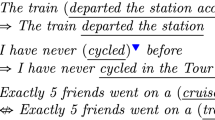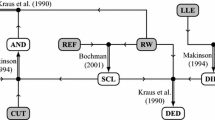Abstract
An important characteristic of many logics for artificial intelligence is that they are nonmonotonic. This means that adding a formula to the premises can destroy some of the consequences. There may exist formulae that can always be safely added to the premises without destroying any of the consequences: they respect monotonicity. We consider three preferential logics for which we analyze the class of formulae which respect monotonicity. For each of the three logics we show that this class is equal to the class of formulae preserved under going to more preferred models, and we provide syntactic characterizations of these classes.
Preview
Unable to display preview. Download preview PDF.
Similar content being viewed by others
References
J.F.A.K. van Benthem, “Semantic parallels in natural language and computation”, in: H.D. Ebbinghaus et al. (eds.), Logic Colloquium, Granada 1987, North Holland, Amsterdam, 1989, pp. 331–375
C.C. Chang, H.J. Keisler, Model Theory, North-Holland, Amsterdam, 1973
M. Davis, “The mathematics of non-monotonic reasoning”, Artificial Intelligence 13, 1980, pp. 73–80
J. Engelfriet, “Minimal Temporal Epistemic Logic”, Technical Report IR-388, Free University Amsterdam, Department of Mathematics and Computer Science, 1995. To appear in Notre Dame Journal of Formal Logic.
D.W. Etherington, Reasoning with Incomplete Information, Morgan Kaufmann Publishers, Inc., Los Altos, California, 1988
J. Engelfriet, J. Treur, “A temporal model theory for default logic”, in: M. Clarke, R. Kruse, S. Moral (eds.), Proc. 2nd European Conference on Symbolic and Quantitative Approaches to Reasoning and Uncertainty, ECSQARU '93, Lecture Notes in Computer Science, vol. 747, Springer Verlag, 1993, pp. 91–96
J. Engelfriet, J. Treur, “Temporal theories of reasoning”, in: C. MacNish, D. Pearce, L.M. Pereira (eds.), Proceedings of the 4th European Workshop on Logics in Artificial Intelligence, JELIA '94, Lecture Notes in Artificial Intelligence, vol. 838, Springer Verlag, 1994, pp. 279–299. Also in: Journal of Applied Non-Classical Logics 5 (2), 1995, pp. 239–261
J. Engelfriet, J. Treur, “Specification of nonmonotonic reasoning”, in: D.M. Gabbay, H.J. Ohlbach (eds.), Proceedings of the International Conference on Formal and Applied Practical Reasoning, FAPR'96, Lecture Notes in Artificial Intelligence, vol. 1085, Springer-Verlag, 1996, pp. 111–125
J.Y. Halpern, Y. Moses, “Towards a theory of knowledge and ignorance”, in: Proceedings of the Workshop on Non-monotonic Reasoning, AAAI, 1984, pp. 125–143
S. Kraus, D. Lehmann, M. Magidor, “Nonmonotonic Reasoning, Preferential Models and Cumulative Logics”, Artificial Intelligence 44, 1990, pp. 167–207
J. McCarthy, “Epistemological problems of artificial intelligence”, in: Proceedings Fifth International Joint Conference on Artificial Intelligence, 1977, pp. 1038–1044
J. McCarthy, “Circumscription — a form of non-monotonic reasoning”, Artificial Intelligence 13, 1980, pp. 27–39
J.-J. Ch. Meyer, W. van der Hoek, Epistemic Logic for Computer Science and Artificial Intelligence, Cambridge Tracts in Theoretical Computer Science 41, Cambridge University Press, 1995.
R. Reiter, “A logic for default reasoning”, Artificial Intelligence 13, 1980, pp. 81–132
R. Reiter, “Equality and domain closure in first-order data bases”, Journal of the ACM 27, 1980, pp. 235–249
Y. Shoham, “A semantical approach to nonmonotonic logics”, in: Proceedings 10th IJCAI, 1987, pp. 388–392
Y. Shoham, Reasoning about Change, MIT Press, Cambridge, 1988
Author information
Authors and Affiliations
Editor information
Rights and permissions
Copyright information
© 1996 Springer-Verlag Berlin Heidelberg
About this paper
Cite this paper
Engelfriet, J. (1996). Only persistence makes nonmonotonicity monotonous. In: Alferes, J.J., Pereira, L.M., Orlowska, E. (eds) Logics in Artificial Intelligence. JELIA 1996. Lecture Notes in Computer Science, vol 1126. Springer, Berlin, Heidelberg. https://doi.org/10.1007/3-540-61630-6_11
Download citation
DOI: https://doi.org/10.1007/3-540-61630-6_11
Published:
Publisher Name: Springer, Berlin, Heidelberg
Print ISBN: 978-3-540-61630-6
Online ISBN: 978-3-540-70643-4
eBook Packages: Springer Book Archive




